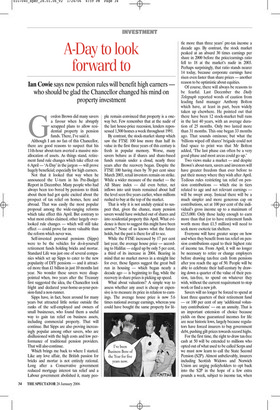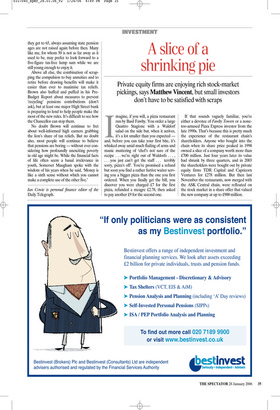A-Day to look forward to
Ian Cowie says new pension rules will benefit high earners who should be glad the Chancellor changed his mind on property investment Gordon Brown did many savers a favour when he abruptly scrapped plans to allow residential property in pension funds. There, I’ve said it. Although I am no fan of this Chancellor, there are good reasons to suspect that his 11th-hour about-turn averted a massive misallocation of assets. As things stand, retirement fund rule changes which take effect on 6 April — ‘A-Day’ in the jargon — will prove hugely beneficial; especially for high earners. Not that it looked that way when he announced the U-turn in his Pre-Budget Report in December. Many people who had always been too bored by pensions to think about them had got quite excited about the prospect of tax relief on homes, here and abroad. That was easily the most popular proposal among the wide-ranging reforms which take effect this April. But contrary to what most critics claimed, other largely overlooked rule changes — which will still take effect — could prove far more valuable than the reform which never was.
Self-invested personal pensions (Sipps) were to be the vehicles for do-it-yourself retirement funds holding bricks and mortar. Standard Life was just one of several companies which set up Sipps to cater to the new popularity of DIY pensions — and it attracted more than £1 billion in just 10 months last year. No wonder these savers were disappointed when, two years after the Treasury first suggested the idea, the Chancellor took fright and declared your-home-as-your-pension-fund a non-runner.
Sipps have, in fact, been around for many years but attracted little notice outside the ranks of the self-employed and owners of small businesses, who found them a useful way to gain tax relief on business assets, including commercial property. That will continue. But Sipps are also proving increasingly popular among other savers, who are disillusioned with the high costs and low performance of traditional pension providers. That will also continue.
Which brings me back to where I started. Like any love affair, the British passion for bricks and mortar is not entirely rational. Long after a Conservative government reduced mortgage interest tax relief and a Labour government abolished it, many peo ple remain convinced that property is a oneway bet. Few remember that at the nadir of the last house-price recession, lenders repossessed 1,500 homes a week throughout 1991.
By contrast, the stock-market slump which saw the FTSE 100 lose more than half its value in the first three years of this century is fresh in popular memory. Worse, many savers behave as if shares and share-based funds remain under a cloud, nearly three years after the recovery began. Despite the FTSE 100 having risen by 70 per cent since March 2003, retail investors remain on strike. While a wider measure of the market — the All Share index — did even better, net inflows into unit trusts remained about half the level seen five years earlier, when millions rushed to buy at the top of the market.
That is why it is not unduly cynical to suspect that, given the chance, many pension savers would have switched out of shares and into residential property this April. What evidence is there to suggest this might have been unwise? None of us knows what the future holds, but the past is there for all to see.
While the FTSE increased by 17 per cent last year, the average house price — according to Halifax — edged up by only 5 per cent, a third of its increase in 2004. Bearing in mind that no market moves in a straight line for ever, those figures suggest the great bull run in housing — which began nearly a decade ago — is beginning to flag, while the recovery in share prices is picking up speed.
What about valuations? A simple way to assess whether any asset is cheap or expensive is to measure its price in relation to earnings. The average house price is now 5.6 times national average earnings, whereas you could have bought the same property for lit tle more than three years’ pre-tax income a decade ago. By contrast, the stock market peaked at an absurd 30 times earnings per share in 2000 before the price/earnings ratio fell to 18 at the market’s nadir in 2003. Perhaps surprisingly, that ratio stands nearer 14 today, because corporate earnings have risen even faster than share prices — another reason to be optimistic about equities.
Of course, there will always be reasons to be fearful. Last December the Daily Telegraph reported words of caution from leading fund manager Anthony Bolton which have, at least in part, been widely taken up elsewhere. He pointed out that there have been 12 stock-market bull runs in the last 40 years, with an average duration of 25 months. Only two lasted more than 31 months. This one began 33 months ago. That sounds ominous; but what the ‘billions wiped off shares’ brigade could not find space to print was that Mr Bolton added, ‘The last phase can often be a very good phase and most areas could go up.’ Two views make a market — and despite Brown’s about-turn, savers and investors will have greater freedom than ever before to put their money where they wish after April. Tedious rules restricting tax relief on pension contributions — which rise in tiers related to age and net relevant earnings will be swept away. Instead there will be a much simpler and more generous cap on contributions, set at 100 per cent of the individual’s gross income up to a maximum of £215,000. Only those lucky enough to earn more than that (or to have retirement funds worth more than £1.5 million) will need to seek more esoteric tax shelters.
Everyone will have greater scope on how and when they benefit from tax relief on pension contributions equal to their highest rate of income tax. From April, it will no longer be necessary to retire or change employers before drawing tax-free cash from pensions after you reach the age of 50. People will be able to celebrate their half-century by drawing down a quarter of the value of their pension, tax-free, to spend on whatever they wish, without the current requirement to stop work or find a new job.
Savers will no longer be forced to spend at least three quarters of their retirement fund — or 100 per cent of any ‘additional voluntary contributions’ — on an annuity. That is an important extension of choice because yields on these guaranteed incomes for life are near historic lows, largely because regulators have forced insurers to buy government debt, pushing gilt prices towards record highs.
For the first time, the right to draw tax-free cash at 50 will be extended to millions who opted out of what used to be called Serps and we must now learn to call the State Second Pension (S2P). Almost unbelievably, insurers including Scottish Widows and Norwich Union are urging policyholders to opt back into the S2P in the hope of a few extra pounds a week, subject to income tax, when they get to 65, always assuming state pension ages are not raised again before then. Many like me, for whom 50 is not as far away as it used to be, may prefer to look forward to a five-figure tax-free lump sum while we are still young enough to enjoy it.
Above all else, the combination of scrapping the compulsion to buy annuities and to retire before drawing benefits will make it easier than ever to maximise tax reliefs. Brown also huffed and puffed in his PreBudget Report about measures to prevent ‘recycling’ pensions contributions (don’t ask), but at least one major High Street bank is preparing to lend to help people make the most of the new rules. It’s difficult to see how the Chancellor can stop them.
No doubt Brown will continue to fret about well-informed high earners grabbing the lion’s share of tax reliefs. But no doubt also, most people will continue to believe that pensions are boring — without ever considering how profoundly unexciting poverty in old age might be. While the financial facts of life often seem a banal irrelevance in youth, Somerset Maugham spoke with the wisdom of his years when he said, ‘Money is like a sixth sense without which you cannot make a complete use of the other five.’























































 Previous page
Previous page